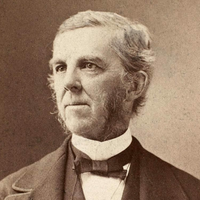The Lover’s Secret
WHAT ailed young Lucius? Art had vainly tried
To guess his ill, and found herself defied.
The Augur plied his legendary skill;
Useless; the fair young Roman languished still.
His chariot took him every cloudless day
Along the Pincian Hill or Appian Way;
They rubbed his wasted limbs with sulphurous oil,
Oozed from the far-off Orient’s heated soil;
They led him tottering down the steamy path
Where bubbling fountains filled the thermal bath;
Borne in his litter to Egeria’s cave,
They washed him, shivering, in her icy wave.
They sought all curious herbs and costly stones,
They scraped the moss that grew on dead men’s bones,
They tried all cures the votive tablets taught,
Scoured every place whence healing drugs were brought,
O’er Thracian hills his breathless couriers ran,
His slaves waylaid the Syrian caravan.
At last a servant heard a stranger speak
A new chirurgeon’s name; a clever Greek,
Skilled in his art; from Pergamus he came
To Rome but lately; GALEN was the name.
The Greek was called: a man with piercing eyes,
Who must be cunning, and who might be wise.
He spoke but little,—if they pleased, he said,
He 'd wait awhile beside the sufferer’s bed.
So by his side he sat, serene and calm,
His very accents soft as healing balm;
Not curious seemed, but every movement spied,
His sharp eyes searching where they seemed to glide;
Asked a few questions,—what he felt, and where?
‘A pain just here,’ ‘A constant beating there.’
Who ordered bathing for his aches and ails?
‘Charmis, the water-doctor from Marseilles.’
What was the last prescription in his case?
‘A draught of wine with powdered chrysoprase.’
Had he no secret grief he nursed alone?
A pause; a little tremor; answer,—'None.’
Thoughtful, a moment, sat the cunning leech,
And muttered ‘Eros!’ in his native speech.
In the broad atrium various friends await
The last new utterance from the lips of fate;
Men, matrons, maids, they talk the question o’er,
And, restless, pace the tessellated floor.
Not unobserved the youth so long had pined
By gentle-hearted dames and damsels kind;
One with the rest, a rich Patrician’s pride,
The lady Hermia, called 'the golden-eyed’;
The same the old Proconsul fain must woo,
Whom, one dark night, a masked sicarius slew;
The same black Crassus over roughly pressed
To hear his suit,—the Tiber knows the rest.
(Crassus was missed next morning by his set;
Next week the fishers found him in their net.)
She with the others paced the ample hall,
Fairest, alas! and saddest of them all.
At length the Greek declared, with puzzled face,
Some strange enchantment mingled in the case,
And naught would serve to act as counter-charm
Save a warm bracelet from a maiden’s arm.
Not every maiden’s,—many might be tried;
Which not in vain, experience must decide.
Were there no damsels willing to attend
And do such service for a suffering friend?
The message passed among the waiting crowd,
First in a whisper, then proclaimed aloud.
Some wore no jewels; some were disinclined,
For reasons better guessed at than defined;
Though all were saints,—at least professed to be,—
The list all counted, there were named but three.
The leech, still seated by the patient’s side,
Held his thin wrist, and watched him, eagle-eyed.
Aurelia first, a fair-haired Tuscan girl,
Slipped off her golden asp, with eyes of pearl.
His solemn head the grave physician shook;
The waxen features thanked her with a look.
Olympia next, a creature half divine,
Sprung from the blood of old Evander’s line,
Held her white arm, that wore a twisted chain
Clasped with an opal-sheeny cymophane.
In vain, O daughter I said the baffled Greek.
The patient sighed the thanks he could not speak.
Last, Hermia entered; look, that sudden start!
The pallium heaves above his leaping heart;
The beating pulse, the cheek’s rekindled flame,
Those quivering lips, the secret all proclaim.
The deep disease long throbbing in the breast,
The dread enchantment, all at once confessed!
The case was plain; the treatment was begun;
And Love soon cured the mischief he had done.
Young Love, too oft thy treacherous bandage slips
Down from the eyes it blinded to the lips!
Ask not the Gods, O youth, for clearer sight,
But the bold heart to plead thy cause aright.
And thou, fair maiden, when thy lovers sigh,
Suspect thy flattering ear, but trust thine eye;
And learn this secret from the tale of old
No love so true as love that dies untold.
. . . . . . . . . .
‘Bravo, Annex!’ they shouted, every one,—
‘Not Mrs. Kemble’s self had better done.’
‘Quite so,’ she stammered in her awkward way,—
Not just the thing, but something she must say.
The teaspoon chorus tinkled to its close
When from his chair the MAN OF LAW arose,
Called by her voice whose mandate all obeyed,
And took the open volume she displayed.
Tall, stately, strong, his form begins to own
Some slight exuberance in its central zone,—
That comely fulness of the growing girth
Which fifty summers lend the sons of earth.
A smooth, round disk about whose margin stray,
Above the temples, glistening threads of gray;
Strong, deep-cut grooves by toilsome decades wrought
On brow and mouth, the battle-fields of thought;
A voice that lingers in the listener’s ear,
Grave, calm, far-reaching, every accent clear,—
(Those tones resistless many a foreman knew
That shaped their verdict ere the twelve withdrew
A statesman’s forehead, athlete’s throat and jaw,
Such the proud semblance of the Man of Law.
His eye just lighted on the printed leaf,
Held as a practised pleader holds his brief.
One whispered softly from behind his cup,
‘He does not read,—his book is wrong side up!
He knows the story that it holds by heart,—
So like his own! How well he’ll act his part!’
Then all were silent; not a rustling fan
Stirred the deep stillness as the voice began.


